What Exactly Makes a Cake Organic?
To be considered organic, a cake must contain at least 95% organic ingredients. This means no synthetic pesticides or genetically modified organisms (GMOs) are permitted. Additionally, it must adhere to strict certification standards set by organisations such as the Soil Association in the UK. Using organic ingredients not only improves the quality and flavour of your cake but also offers potential health benefits. Dive deeper to learn more about the wider impact of organic practices in baking.
Key Takeaways
A cake is deemed organic if at least 95% of its ingredients are certified organic, following Soil Association standards. Organic cakes steer clear of synthetic pesticides, artificial additives, and genetically modified organisms (GMOs), which helps maintain a natural quality.
Using organic ingredients like flours, sweeteners, and dairy alternatives can boost both flavour and nutritional value. It’s crucial to label organic ingredients correctly to ensure compliance and keep consumer trust.
Organic baking prioritises sustainable practices and transparency in sourcing, making it a popular choice among health-conscious consumers.
Understanding Organic Certification Standards
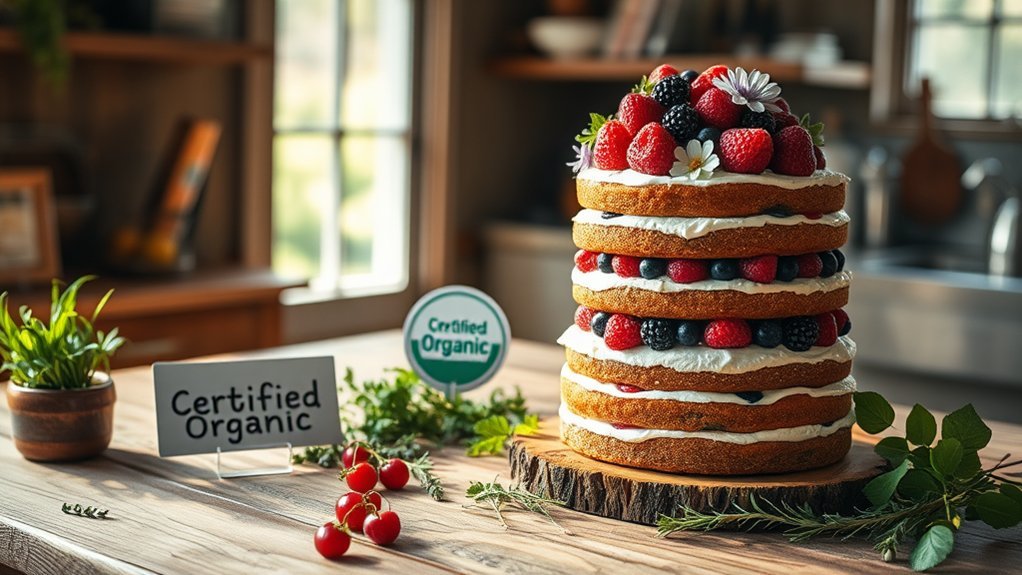
When baking an organic cake, it’s essential to understand organic certification standards to ensure your ingredients meet the necessary regulations. In the UK, the Soil Association oversees organic certification, which requires that at least 95% of the ingredients are organic to use the “Organic” label. It’s important to check that no synthetic pesticides or genetic modifications are involved, as small producers may face compliance issues. Additionally, the global organic bakery market continues to grow, reflecting the rising consumer demand for organic products. Clear labelling is also crucial; products must clearly state organic ingredients. Compliance with USDA Organic Seal can further enhance consumer trust in the product. Non-compliance can result in penalties, so it’s vital to adhere to both Soil Association and Food Standards Agency guidelines. Keeping detailed records supports traceability and prepares you for audits, ensuring your cake not only meets organic standards but also meets consumer quality expectations.
Key Organic Ingredients in Cake Baking
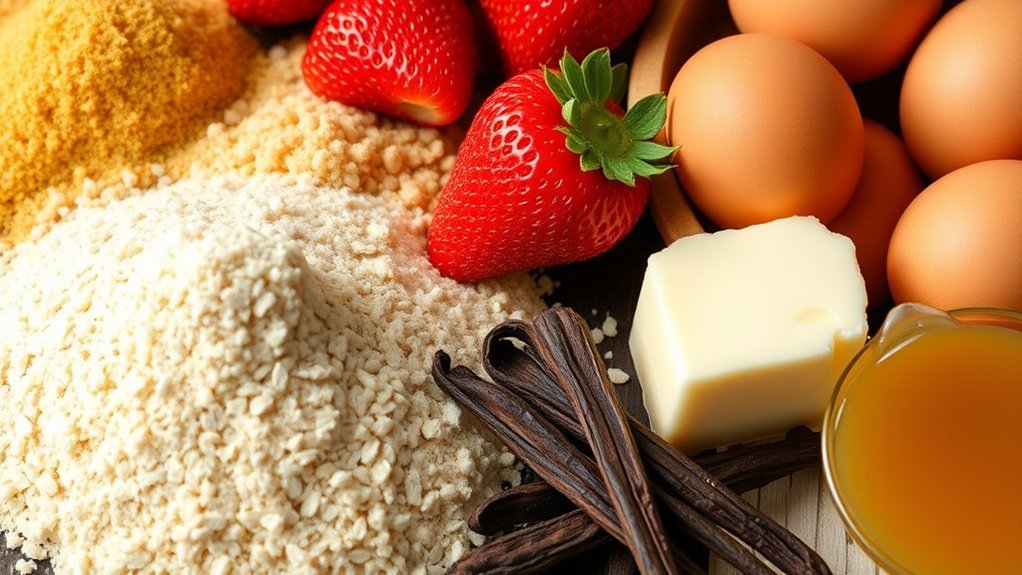
Understanding organic certification standards is essential for choosing the right ingredients for cake baking.
Opt for organic cake flour for a light texture or wholemeal flour for added nutrition. Sweeteners like organic honey or coconut sugar not only enhance the flavour but also provide health benefits. For oils, consider organic coconut oil or avocado oil for moisture and healthy fats. If you’re looking for dairy alternatives, organic almond milk or coconut cream can add richness. For egg replacements, organic applesauce or silken tofu can help with moisture and binding. Additionally, using organic ingredients like Florida Crystals® Regenerative Organic Raw Cane Sugar can elevate the quality and sustainability of your cake. Using organic baking agents such as baking powder or baking soda can also significantly improve the texture and rise of your baked goods.
The Role of Organic Farming Practices

Organic farming practices are crucial for creating a sustainable foundation for cake baking, as they prioritise environmental health and ingredient quality. By steering clear of synthetic pesticides, these methods help reduce pollution and improve soil health, which is vital for thriving ecosystems. Choosing organic ingredients supports biodiversity, promotes healthier soil, helps combat climate change, and conserves natural resources. Additionally, sourcing ingredients locally not only strengthens community ties but also ensures fresher, higher-quality products. By promoting eco-friendly sourcing, opting for organic not only boosts the nutritional value of your baked goods but also demonstrates a responsible commitment to serving your customers and the planet. Furthermore, organic farming practices contribute to biodiversity preservation, ensuring a healthier ecosystem that benefits both agriculture and the environment. By choosing organic, you’re making a positive difference for both your clientele and the environment.
Importance of Labeling and Compliance
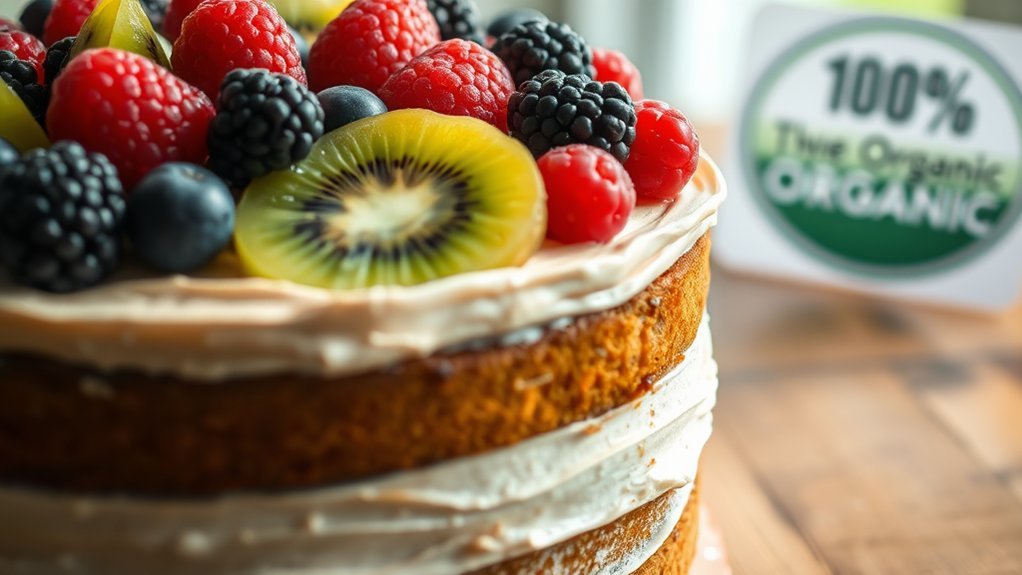
When it comes to organic cakes, proper labelling is crucial for compliance with UK standards.
Regulatory inspections ensure that these labelling requirements are met, which helps maintain consumer trust and access to the market.
By being transparent in your product’s labelling, you not only fulfil your legal obligations but also boost your bakery’s reputation.
For instance, clearly indicating organic ingredients can attract health-conscious customers and set your products apart.
Correct Labeling Practices
How important is accurate labeling in the organic food sector? It’s crucial for maintaining consumer trust and ensuring compliance with labelling regulations. Inaccurate labels can lead to fines and damage your reputation.
Here are some key points to consider:
- Clearly label products as “organic” and list organic ingredients.
- Use the Soil Association organic logo for products containing at least 95% organic ingredients.
- Include the name of the certifying body on your labels.
- Be aware that “Made with Organic” products have different labelling criteria.
Accurate labelling not only informs consumers but also upholds the integrity of organic standards.
Regulatory Inspection Requirements
What drives the strict regulatory inspection requirements in the organic food sector? The need for trust and transparency leads to rigorous compliance checks.
Each organic operation is subject to annual inspections by certifying agents accredited by the UK’s Department for Environment, Food & Rural Affairs (DEFRA) to ensure they meet organic standards. This annual inspection frequency confirms that practices, from soil quality to product handling, comply with demanding organic regulations.
Inspectors carefully review documentation and conduct on-site checks to ensure that no synthetic substances are used and that buffer zones are maintained. These measures help prevent contamination and uphold the integrity of organic products.
Health Benefits of Organic Cakes

Many people enjoy cakes as a treat, but opting for organic varieties can significantly improve your health.
Organic cakes come with several nutritional benefits, helping to address allergenic concerns and support chronic disease prevention.
Here are some key advantages to consider:
- Higher nutrient content thanks to better farming methods.
- Reduced exposure to chemicals by steering clear of synthetic pesticides and GMOs.
- Natural sweeteners help keep blood sugar levels in check.
- Enhanced flavour without artificial additives, making each bite more enjoyable.
Choosing organic cakes not only satisfies your sweet tooth but also contributes to your overall wellbeing.
Environmental Impact of Organic Baking

Choosing organic cakes not only benefits your health but also positively impacts the environment. By opting for locally sourced ingredients, you can significantly reduce the carbon footprint linked to transportation. Organic options are free from harmful chemicals, which helps maintain soil health and supports local wildlife. This choice also strengthens local economies and promotes fair working conditions.
Moreover, effective waste management, like reducing packaging and using ingredients wisely, adds to the ecological advantages.
Energy-efficient baking methods and water-saving techniques demonstrate a commitment to environmental responsibility. By choosing organic, you support a sustainable food system that values both people and the planet, making a real difference with every cake you serve.
Taste and Texture Differences in Organic Cakes

Choosing organic cakes means that the quality of the ingredients plays a crucial role in both taste and texture.
You’ll find that the flavour profiles can differ significantly, thanks to the use of natural components, which often leads to a more complex taste. For example, an organic chocolate cake made with high-quality cocoa will have a richer flavour compared to one made with artificial ingredients.
Furthermore, without artificial additives, the moisture and texture of the cakes can vary; some may be lighter, while others might feel denser, depending on the specific organic ingredients used.
Ingredient Quality Impact
The quality of ingredients in organic cakes significantly impacts their taste and texture, distinguishing them from standard options.
Here are some key differences arising from careful ingredient sourcing and a commitment to sustainability:
- Moisture Content: Organic ingredients provide natural softness without the need for artificial additives.
- Flour Type: Less processed organic flours deliver a richer, more authentic flavour and texture.
- Sugar Quality: Organic sugars, such as cane sugar, help retain moisture and offer a purer taste.
- Dairy Freshness: Organic eggs and milk enhance flavours and improve emulsification.
These factors contribute to organic cakes that aren’t only delicious but also demonstrate a commitment to quality and sustainability, making them a great choice for those who wish to serve with care.
Flavor Profile Variations
Many people assume that organic cakes compromise on flavour, but that’s not the case. In fact, they can offer a unique taste experience thanks to natural ingredients influenced by soil quality and climate. For instance, an organic chocolate cake made with high-quality cocoa can taste richer than its non-organic counterpart.
Consumer attitudes also play a significant role; if people have a positive view of organic products, they tend to rate the flavour higher.
The variety of aromas in organic cakes, driven by plant-based extracts and spices, adds a depth of flavour often missing in synthetic options. With a focus on both traditional and exotic flavours, organic cakes appeal to a wide range of tastes, making them an enjoyable choice for anyone looking for a treat that aligns with health-conscious decisions.
Texture and Moisture Differences
While many bakers may not consider how ingredients affect cake texture and moisture, using organic components can significantly improve these traits.
Choosing high-quality organic ingredients can lead to noticeable texture variations and better moisture retention in your cakes:
- Flour Options: Organic flours like spelt create denser cakes.
- Sweeteners: Using honey instead of regular sugar adds both flavour and moisture.
- Fat Choices: Organic fats, such as coconut oil, boost both taste and moisture levels.
- Liquid Ingredients: Adding buttermilk can greatly enhance moisture content.
These components work together to produce cakes that aren’t only delicious but also have a tender crumb and appealing texture.
Challenges Faced by Organic Bakeries
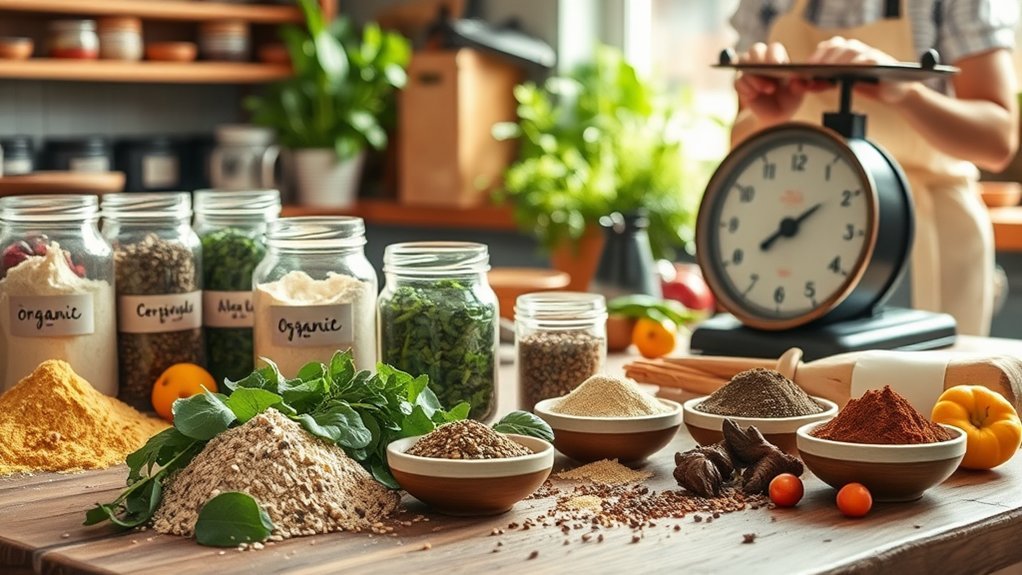
Organic bakeries face a range of challenges in a competitive market that can impede their growth and long-term viability. Competing against traditional bakeries, they often grapple with higher costs associated with sourcing organic ingredients and face issues related to availability. Inflation exacerbates these competition issues, making it increasingly difficult to maintain profitability. Additionally, they must navigate strict regulatory compliance, adding complexity to their operations. Misconceptions surrounding health benefits can also negatively influence consumer choices.
| Challenge | Impact on Organic Bakeries |
|---|---|
| Competition from Traditional Bakeries | Pressure on pricing and market share |
| Limited Availability of Organic Ingredients | Difficulty in maintaining product quality |
| Inflation and Rising Costs | Reduced profit margins |
| Regulatory Compliance | Increased operational complexity |
| Misunderstandings about Health Benefits | Misguided consumer preferences |
Cost Considerations for Organic Ingredients
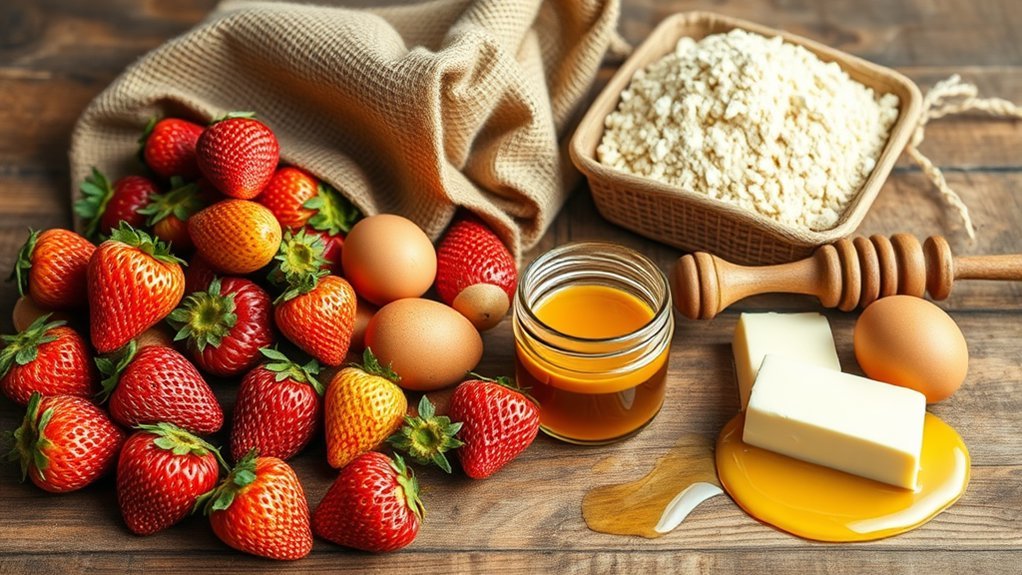
When sourcing organic ingredients, you’ll face challenges that can raise costs. These include the price premiums for organic certification and stricter production standards.
It’s important to recognise how these elements affect your baking expenses. For instance, organic flour may cost more than conventional options, but it can enhance the quality of your cakes.
Ingredient Sourcing Challenges
Sourcing organic ingredients presents several challenges that can affect your production costs and overall business sustainability. The limited availability of organic ingredients complicates sourcing and disrupts your supply chain, especially when demand exceeds supply.
Here are some key challenges to consider:
- Seasonal variations can impact the quality and consistency of organic ingredients, making it tough to maintain uniformity in your products.
- A fragmented supply chain can hinder traceability and complicate inventory management, leading to potential shortages.
- Domestic shortages might necessitate importing ingredients, which can drive up costs significantly.
- Strict certification requirements can restrict your flexibility, adding extra time and expense to your operations.
Effectively navigating these challenges is crucial for preserving the integrity and sustainability of your organic products while meeting your customers’ needs.
Price Premium Factors
Navigating the complexities of sourcing organic ingredients often leads to discussions about price premiums that affect both producers and consumers. The expenses tied to organic certification, regulatory compliance, and strict labelling requirements significantly elevate prices.
For instance, organic flour and sugar can be up to 50% more expensive than their conventional counterparts. Additionally, lower crop yields and the need for more manual labour further raise production costs.
While consumers are increasingly willing to pay a premium for organic products, it’s crucial to ensure price transparency. By educating consumers about these factors, we can help them appreciate the value of organic goods, enabling informed choices and supporting sustainable practices in their communities.
Consumer Perceptions of Organic Products

How do consumers in the UK perceive organic products today? Understanding these perceptions is crucial for influencing buying habits and improving consumer education.
- Health Benefits: Many of you see organic foods as healthier choices, steering clear of harmful pesticides and genetically modified organisms (GMOs).
- Environmental Concerns: A significant number of consumers prioritise sustainability and environmental responsibility, which affects your purchasing decisions.
- Cost-Effectiveness: While organic products can be more expensive, you may view them as a valuable investment in your long-term health.
- Certification and Standards: Trust in organic labels is vital; you depend on certifications to ensure quality and commitment to sustainable practices.
These aspects highlight how your views and choices regarding organic products are influenced by a blend of health considerations, environmental values, and educational insights.
The Future of Organic Baking in the Industry
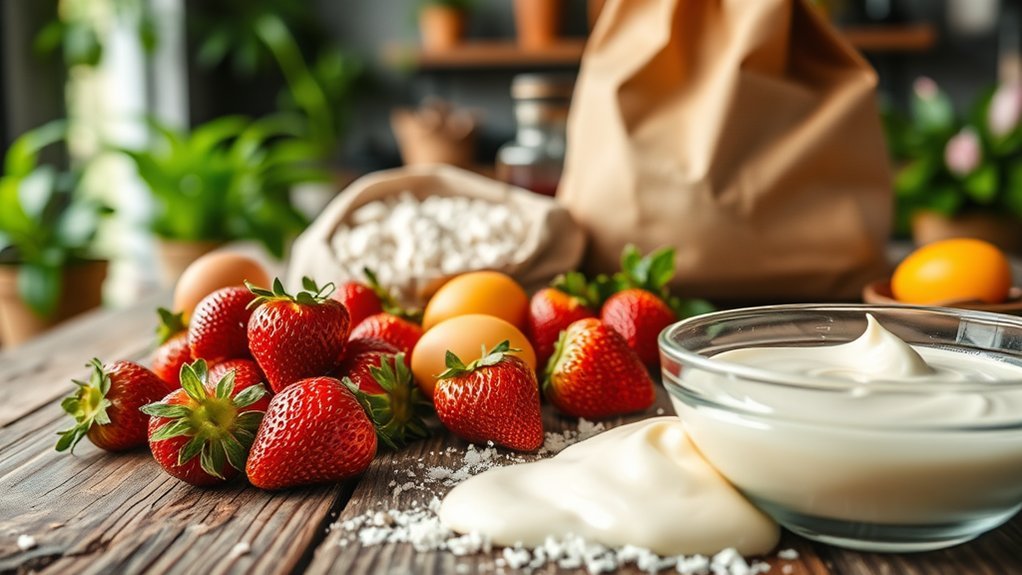
As the demand for healthier and more sustainable food options grows, the future of organic baking in the UK looks bright. There’s a noticeable shift towards sustainable practices and innovative products, driven by consumer preferences for organic, gluten-free, and vegan options.
The rise of online shopping is broadening market reach, enabling bakeries to connect with more customers than ever.
Technological advancements, especially in AI, are improving production efficiency and allowing bakeries to adapt their offerings to meet changing consumer trends. Additionally, the increasing availability of alternative ingredients is encouraging creative recipes without compromising quality.
While there are challenges in sourcing organic materials, the financial outlook remains positive, with market projections showing significant growth.
Frequently Asked Questions
How Can I Identify Organic Cakes in Stores?
To identify organic cakes in shops, look for certification logos on the packaging and information about ingredient sourcing. Check the ingredient lists to ensure they meet organic standards. Also, keep an eye out for specific sections that feature well-known brands committed to organic products.
Are Homemade Cakes Eligible for Organic Certification?
Homemade cakes can qualify for organic certification if all the ingredients meet UK organic standards. However, the certification process can be complex and expensive, particularly for small-scale bakers. For instance, if you’re using organic flour and eggs, you’ll need to ensure all components, like sugar and butter, are also certified organic.
What Storage Methods Preserve Organic Cake Freshness?
To keep organic cake fresh, refrigerate it and store it in airtight containers. This reduces air exposure, locks in moisture, and keeps out unwanted smells, helping your cake stay tasty and fresh for longer.
Can I Convert a Regular Cake Recipe to Organic?
You can easily convert a standard cake recipe to organic by substituting ingredients with organic alternatives. For instance, use organic flour, sugar, and eggs to ensure everything is sourced organically. Just be sure to adjust the ratios as needed to keep the taste and texture on point. It’s a simple process that can make your baking more wholesome.
Are There Specific Organic Certifications for Gluten-Free Cakes?
Yes, gluten-free cakes can obtain organic certification, but it involves a detailed process. You’ll need to ensure that all ingredients are sourced from certified organic suppliers, prevent any cross-contamination with gluten, and comply with UK organic standards. For instance, using certified gluten-free flour from organic farms can help maintain the integrity of your cake.
Conclusion
In baking, choosing organic is not just a passing trend; it reflects a commitment to quality and sustainability. By opting for organic ingredients, you support healthier practices and foster a connection between nature and your taste buds. While there may be some challenges, the satisfaction of enjoying a cake made with care and integrity is well worth it. As the industry develops, choosing organic treats shows you value both flavour and responsibility.





